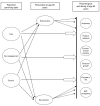Parental practices predict psychological well-being in midlife: life-course associations among women in the 1946 British birth cohort
- PMID: 19995477
- PMCID: PMC3204412
- DOI: 10.1017/S0033291709991978
Parental practices predict psychological well-being in midlife: life-course associations among women in the 1946 British birth cohort
Abstract
Background: Certain parenting styles are influential in the emergence of later mental health problems, but less is known about the relationship between parenting style and later psychological well-being. Our aim was to examine the association between well-being in midlife and parental behaviour during childhood and adolescence, and the role of personality as a possible mediator of this relationship.
Method: Data from 984 women in the 1946 British birth cohort study were analysed using structural equation modelling. Psychological well-being was assessed at age 52 years using Ryff's scales of psychological well-being. Parenting practices were recollected at age 43 years using the Parental Bonding Instrument. Extraversion and neuroticism were assessed at age 26 years using the Maudsley Personality Inventory.
Results: In this sample, three parenting style factors were identified: care; non-engagement; control. Higher levels of parental care were associated with higher psychological well-being, while higher parental non-engagement or control were associated with lower levels of psychological well-being. The effects of care and non-engagement were largely mediated by the offspring's personality, whereas control had direct effects on psychological well-being. The psychological well-being of adult women was at least as strongly linked to the parenting style of their fathers as to that of their mothers, particularly in relation to the adverse effects of non-engagement and control.
Conclusions: This study used a prospective longitudinal design to examine the effects of parenting practices on psychological well-being in midlife. The effects of parenting, both positive and negative, persisted well into mid-adulthood.
Figures


 , indirect).
, indirect).Similar articles
-
The relationship between early personality and midlife psychological well-being: evidence from a UK birth cohort study.Soc Psychiatry Psychiatr Epidemiol. 2008 Sep;43(9):679-87. doi: 10.1007/s00127-008-0355-8. Epub 2008 Apr 28. Soc Psychiatry Psychiatr Epidemiol. 2008. PMID: 18443733 Free PMC article.
-
Does Harm Avoidance mediate effects of recollected parental bonding on mental distress in adulthood?Compr Psychiatry. 2014 May;55(4):1007-14. doi: 10.1016/j.comppsych.2013.12.005. Epub 2013 Dec 10. Compr Psychiatry. 2014. PMID: 24439633
-
Adolescent mental health and subsequent parenting: a longitudinal birth cohort study.J Epidemiol Community Health. 2014 May;68(5):396-402. doi: 10.1136/jech-2013-202997. Epub 2013 Dec 19. J Epidemiol Community Health. 2014. PMID: 24357583 Free PMC article.
-
Childhood and adulthood psychological ill health as predictors of midlife affective and anxiety disorders: the 1958 British Birth Cohort.Arch Gen Psychiatry. 2007 Jun;64(6):668-78. doi: 10.1001/archpsyc.64.6.668. Arch Gen Psychiatry. 2007. PMID: 17548748
-
Recollections of parental behaviour, adult attachment and mental health: mediating and moderating effects.Psychol Med. 1998 Nov;28(6):1443-55. doi: 10.1017/s0033291798007533. Psychol Med. 1998. PMID: 9854285 Review.
Cited by
-
Observing Change Over Time in Strength-Based Parenting and Subjective Wellbeing for Pre-teens and Teens.Front Psychol. 2019 Oct 10;10:2273. doi: 10.3389/fpsyg.2019.02273. eCollection 2019. Front Psychol. 2019. PMID: 31649593 Free PMC article.
-
Do cherished children age successfully? Longitudinal findings from the Veterans Affairs Normative Aging Study.Psychol Aging. 2015 Dec;30(4):894-910. doi: 10.1037/pag0000050. Epub 2015 Oct 5. Psychol Aging. 2015. PMID: 26436456 Free PMC article.
-
Personality traits mediate the association between perceived parental bonding and well-being in adult volunteers from the community.Biopsychosoc Med. 2020 Oct 19;14:28. doi: 10.1186/s13030-020-00198-4. eCollection 2020. Biopsychosoc Med. 2020. PMID: 33088338 Free PMC article.
-
Factor structure and psychometric properties of Polish version of Parental Bonding Instrument (PBI) among adults and adolescents.PLoS One. 2022 Aug 25;17(8):e0272617. doi: 10.1371/journal.pone.0272617. eCollection 2022. PLoS One. 2022. PMID: 36006910 Free PMC article.
-
Parental warmth during childhood predicts coping and well-being in adulthood.J Fam Psychol. 2018 Aug;32(5):610-621. doi: 10.1037/fam0000401. Epub 2018 Apr 30. J Fam Psychol. 2018. PMID: 29708363 Free PMC article.
References
-
- Amato PR, Sobolewski JM. The effects of divorce and marital discord on adult children’s psychological well-being. American Sociological Review. 2001;66:900–921.
-
- An JS, Cooney TM. Psychological well-being in mid to late life : The role of generativity development and parent-child relationships across the lifespan. International Journal of Behavioral Development. 2006;30:410–421.
Publication types
MeSH terms
Grants and funding
LinkOut - more resources
Full Text Sources
Medical

